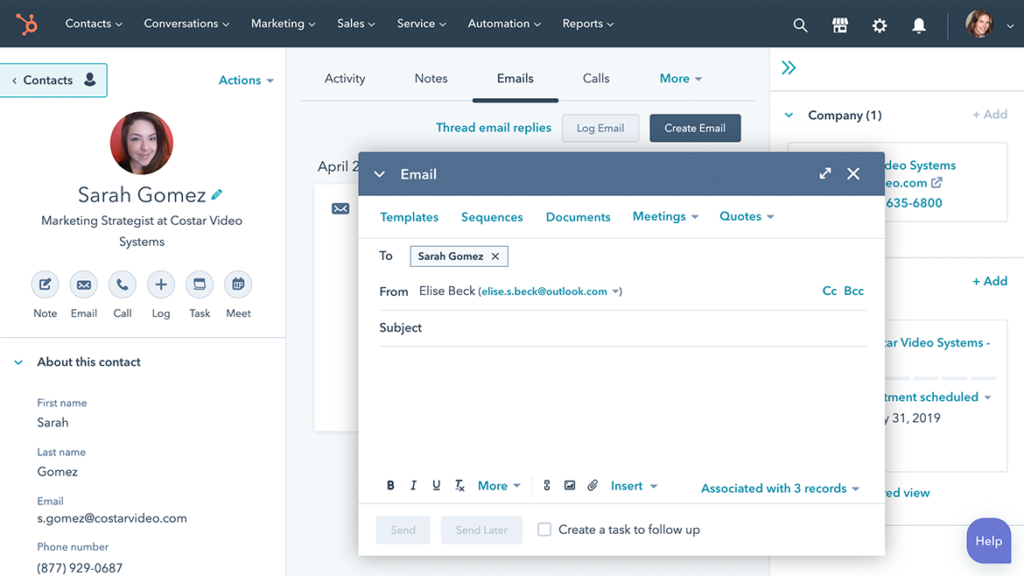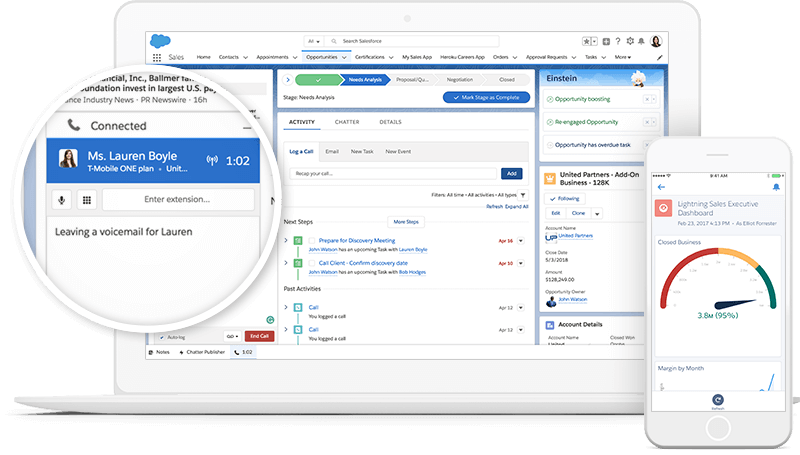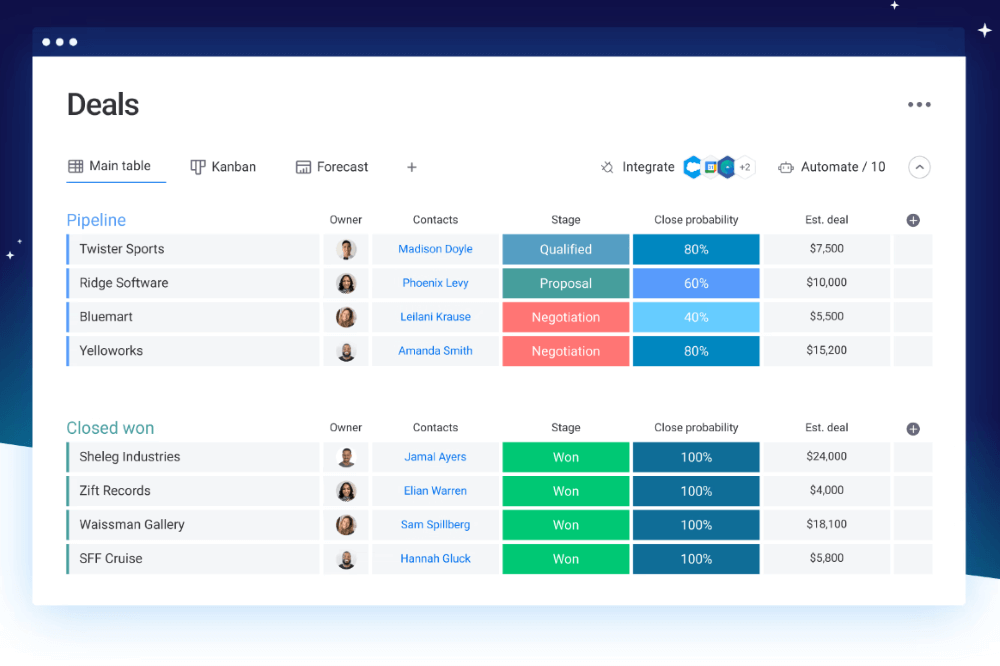If your sales team is struggling to close deals, the issue may not be with your lead generation. It could be how you’re following up with those leads.
Far too many businesses let potential customers slip through the cracks simply due to inconsistent or ineffective lead follow-up processes. In fact, most sales are lost because leads aren’t nurtured long enough or often enough to convert into customers.
Having a lead follow-up system—a combination of processes and tools to engage and nurture leads—solves this problem.
In practice, implementing an effective lead follow-up system usually means using CRM software, combined with a strategy that’s unique to the business. Method, for example, is a fully customizable CRM that integrates seamlessly with QuickBooks and automates your follow-up reminders, streamlines your emails, and organizes your lead data.
In this guide, we’ll explore exactly why effective lead follow-up matters, how you can build a winning follow-up process, and which tools—including Method CRM—can best support your sales strategy.
| What is lead management? Lead management is the process of capturing leads, then qualifying and nurturing them to turn them into business opportunities. Managing leads can be a complex process as your lead count grows. Having a lead management system in place helps you make the most out of prospects interested in your product or service. |
Why following up on leads is crucial
Most leads don’t turn into customers upon first contact. In fact, according to IRC Sales Solutions, only 2% of sales happen at the initial touchpoint. That means a staggering 98% of your leads need consistent and persistent follow-ups before they’re ready to buy.
Moreover, research over the years has shown that as much as 80% of sales require five or more follow-ups, yet many salespeople give up after just one attempt.
Here are some key reasons why diligent follow-ups matter:
- Stay top-of-mind. Regular contact ensures your business remains visible when leads are ready to buy.
- Build trust over time. Consistent communication demonstrates reliability and attentiveness.
- Address concerns effectively. Multiple interactions give you more opportunities to handle objections and answer questions.
- Engage hesitant leads. Persistent follow-ups provide multiple touchpoints for prospects who aren’t initially ready to commit.
Think about your own buying experiences. After a single product demo or just one email, you might still have reservations. But a timely and helpful follow-up a week later may sway your decision, moving you closer to a purchase.
Ultimately, without a structured approach to lead follow-ups, you’re leaving valuable revenue opportunities on the table.
The challenges of manual lead follow-up
Manually managing lead follow-ups—whether through spreadsheets, memory, or sticky notes—is not only challenging, it’s inefficient.
Without a structured lead management system, your sales team is likely to lose track of important leads, letting potential customers slip through the cracks. It’s also incredibly time-consuming to manually send every email or set reminders for follow-up tasks.
Picture this common scenario: A sales rep is juggling multiple disorganized Excel sheets, long email threads, and scribbled notes scattered everywhere. It quickly becomes overwhelming, making it almost impossible to clearly understand where each lead stands and what needs to happen next.
This manual approach might work temporarily with a handful of leads, but as your business grows and lead volume increases, it simply doesn’t scale. You’ll soon find that you’re wasting hours trying to keep everything organized, just to maintain an ineffective status quo.
That’s valuable time that should be spent engaging prospects and closing deals.
This challenge is exactly why businesses rely on lead management systems to automate and scale these processes.
What is a lead follow-up system?
A lead follow-up system is a structured process—usually supported by software—that helps your team track leads through the sales cycle and follow up at the right time with the right message.
Its core purpose is to consistently nurture leads until they’re ready to make a purchase.
An effective lead follow-up system allows you to:
- Follow up swiftly with new leads, improving your chance of connecting.
- Increase your win conversion rate through persistent, well-timed outreach.
- Automate routine tasks like emails and reminders, saving hours of manual work.
- Stay focused on selling while the system handles background admin.
In most businesses, the follow-up system is powered by CRM software, which not only keeps records organized but also automates actions like scheduling calls or sending follow-up emails.
8 lead follow-up best practices
Now that we know what a lead follow-up system is, let’s explore how to follow-up with and nurture leads effectively.
Here are eight best practices to improve your lead follow-up process:
1. Respond to new leads as fast as possible
Timing is everything. According to industry research, you’re 100× more likely to connect with a lead if you follow up within 5 minutes versus waiting 30 minutes. Wait longer than that, and your chances of connecting with your new lead diminish exponentially.
To seize this narrow window of opportunity, use automation tools like instant alerts or autoresponders to engage leads before their interest fades.
2. Personalize your outreach
Generic messages get ignored. Or, at least, buried in peoples’ overflowing inboxes. To cut through the noise, use the lead’s name and reference their specific interest or recent activity.
Personalized emails consistently outperform mass templates and show that you’re paying attention. Even a small effort to personalize emails and outreach can pay dividends.
3. Use multiple touchpoints
Don’t just rely on email. Mix in calls, texts, or even a quick LinkedIn message to reach leads where they’re most comfortable. Multi-channel outreach increases the odds of getting a response.
4. Stick to a follow-up schedule
A structured follow-up cadence helps you stay consistent without overwhelming the lead.
For example, stick to a cadence like:
- Day 0 (initial response)
- Day 2 (follow-up)
- Day 7 (second follow-up)
- Day 14 (final follow-up)
That’s just a template. You will need to test and optimize this follow-up cadence to see what works best for your prospect pool. Experiment with different numbers of follow-ups, difference cadences, and outreach channels to see what works. Adjust this based on lead type and engagement signals.
5. Track every interaction in one place
Whether it’s a call, email, or meeting note, log everything in your CRM. This gives your team full visibility into where each lead stands and what the next step should be.
That ensures that you can properly engage with each individual lead, and it gives you macro data into how effective your follow-up strategies are across your lead portfolio.
6. Segment and prioritize your leads
Not all leads deserve the same level of effort. Some are cold leads, while others are burning hot and need to be contacted immediately. Everyone will have different ways of determining lead temperature, but lead scoring tools and form fields can help give you an idea how much potential there is for each inbound lead you receive.
Use these tools to identify who’s “hot” (like someone who requested a demo) versus who’s still cold (someone who downloaded a guide). Tailor your follow-up strategy accordingly to focus your time where it counts.
7. Provide value in each follow-up
Instead of just “checking in,” offer something helpful. Share a case study, a relevant blog post, or a personalized tip. Each touchpoint should move the lead closer to a decision, not just fill their inbox with the same “Hey, are you still interested?” message said six different ways.
8. Be persistent, but know when to stop or shift gears
Follow up multiple times, but avoid coming off as spammy. If you’ve reached out five to seven times with no response, consider pausing or switching the lead into a long-term nurture sequence.
Top 5 lead follow-up systems for companies in 2026
Best practices are great. But they are relatively meaningless if you don’t have the right software in place to execute them. A solid lead follow-up tool will help turn these concepts into actions by automating your reminders, tracking interest, and even handling more complex and persona-targeted follow-ups like drip campaigns.
Here are five of the top-rated lead follow-up systems for you to consider in 2026.
Method CRM: Built for small business using Quickbooks
Uh oh, our bias is showing! Bear with us for a second while we make the case for why Method CRM is a great choice for small businesses—especially those that use Quickbooks.
Here’s why:
- Automated lead capture via customizable web-to-lead forms that feed directly into your pipeline.
- Seamless email integration that lets you send and track communications without ever leaving the CRM.
- QuickBooks sync that can easily turn leads into customers, pushing invoices and records into your accounting system without double data entry.
Notable features for lead follow-up include:
- Triggered email campaigns and reminders.
- Custom fields and pipelines tailored to your business process.
- Advanced automation workflows and integrations with QuickBooks and Xero.
Pricing (for annual billing):
- Contact Management: $27 per user per month
- CRM Pro: $45 per user per month
- CRM Enterprise: $73 per user per month
- Free trial available
If you love control and want full flexibility with financial integration, Method CRM is a powerful choice. Learn more about QuickBooks CRM integration.
Pipedrive: Intuitive pipeline with activity-based automation
Pipedrive is built around visual pipeline management and is ideal for teams who want structured sales flow and minimal training.
Key advantages:
- Log everything—phone calls, SMS test message, emails, notes—in activity reminders
- Easy automation for follow-up tasks and drip emails
- Extensions like LeadBooster add chatbots, web forms, and lead routing
- A live overview of what your leads are doing in an in-app center
- Manage leads from your inbox with an email sidebar
- Track the source of your leads
- View your leads in multiple drag-and-drop pipelines
Pricing:
- Lite: $14 per user per month
- Growth: $39 per user per month
- Premium: $49 per user per month
- Ultimate: $79 per user per month
- 14-day free trial available
HubSpot CRM: Free foundation with upgrade options
HubSpot is a top lead management software for growing businesses. It offers an all-in-one solution including marketing, sales, service and operations.
Key advantages:
- Unlimited users and unlimited storage on the free plan
- Automations: send scheduled follow-ups, assign tasks, and nurture email sequences
- Paid tiers unlock advanced features like advanced reporting, chatbots, and ABM tools
Pricing:
You can get started for free with HubSpot’s lead management software: Sales Hub.
If you want more advanced features to automate your sales operations, you can access them via the Starter, Professional, and Enterprise editions of Sales Hub.
The plans are priced as follows:
- Starter: Starts at $15 per user per month
- Professional: Starts at $100 per user per month
- Enterprise: Starts at $150 per user per month
However, it’s important to mention that HubSpot sells its software in bundles or “hubs”. Pricing depends on how many business tools you need, and the final cost can quickly add up.

Salesforce: Enterprise-grade CRM with deep customization
Salesforce is a go-to choice for mid-size to large organizations that need powerful lead management and follow-up capabilities. It allows you to track all of the important information about your CRM leads and can scale dramatically with integrations and additional custom features.
Key advantages:
- Extremely robust tracking and automation across every stage of the customer journey
- Strong integrations with marketing and analytics tools
- Designed for scalability but can require specialized training and setup
- Rich activity timeline with a view of the most up-to-date contact information
- Automated tracking of calls, meetings and emails
- Customizable reports and dashboards
- The ability to track marketing campaigns across all channels including social media
Pricing (pricing structures may vary):
- Starter Suite: $25 per user per month
- Pro Suite: $100 per user per month (billed annually)
- Enterprise: $165 per user per month (billed annually)
- Marketing Cloud Account Engagement (formerly Pardot): $1,250 per month for up to 10,000 contacts (billed annually)
- Free trial available

Monday Sales CRM: Visual pipeline with collaboration at its core
Monday offers a visually engaging CRM built on its popular project management platform. It boasts an intuitive and powerful lead management solution with multiple functions all in one platform.
Key features:
- Visually driven interface with no-code customizations
- Automations for email reminders, task assignments, and pipeline transitions
- Collaboration features like shared boards and activity dashboards
- Lead imports through integrations with multiple platforms
- Deals board to track progress of every lead
- Centralized communication to track interactions with leads
- Quoting and invoicing capabilities
Pricing:
Up to two users can use the free version of Monday Sales CRM with limited features. They offer four paid pricing plans, which include:
- Basic: $12 per user per month
- Standard: $17 per user per month
- Pro: $28 per user per month
- Enterprise: Contact them for more information

Choosing the right lead follow-up system
Each of these lead follow-up systems can help you stay on top of every lead. But, like with all software, they have different strengths and focus areas. Depending on your business, you may not need the horsepower of Salesforce, or the collaboration capability of Monday.
Here’s a simple table to help you select the best tool for your needs.
| Tool | Best for | Strength |
| Method CRM | QuickBooks-integrated small businesses | Full lead-to-accounting sync |
| Pipedrive | Sales teams needing strong pipeline management | Visual flow, easy automation |
| HubSpot | Growing teams | Free start, easy scale |
| Salesforce | Enterprise-level users | Comprehensive features and integrations |
| Monday Sales CRM | Teams valuing visual workflows | Collaboration and flexibility |
For small businesses that depend on QuickBooks and crave customization, Method CRM’s free trial is a smart first step.
Why Method CRM stands out for lead management
You may lean towards using Excel spreadsheets as a way to track sales leads. But when leads start coming in rapidly, and you’re flooded with potential business, you’ll want to make sure no one slips through the cracks.
Method CRM addresses nearly every pain point small businesses face when it comes to lead follow-up, and does it with a level of customization and QuickBooks integration that few other tools can match.
Instead of juggling messy spreadsheets or chasing sticky notes, Method captures and organizes leads automatically through customizable web-to-lead forms. Every interaction is logged in real time, giving your team full visibility into the lead journey—from first contact to closed deal.
But Method goes beyond the basics. It also:
- Tracks sales rep performance and commissions, so you can incentivize follow-up consistency.
- Automatically syncs new customers to QuickBooks or Xero, ensuring your accounting only reflects actual buyers—not prospects.
- Keeps all your data in one place, eliminating duplicate entry and saving hours in admin time.
This seamless integration between sales and back office means your team spends less time managing data and more time closing deals. And with Method’s drag-and-drop customization, you can tailor every aspect of your follow-up workflows to match your business process—not the other way around.
Whether you’re scaling your team or simply tired of letting leads fall through the cracks, Method CRM delivers a follow-up experience that’s streamlined, smart, and built for small business success.
Key takeaways
Let’s recap what we learned in this article:
- Lead follow-up is where deals are won or lost. Most sales happen after multiple touchpoints, so consistent, well-timed follow-ups are essential.
- Manual follow-up doesn’t scale. Spreadsheets and sticky notes just can’t keep up as your lead volume grows.
- A lead follow-up system helps you stay organized. Automate tasks and never miss an opportunity.
- The right tool makes all the difference. Whether it’s speed, personalization, or multi-channel outreach, a system ensures you follow best practices every time.
- Look for a solution that fits your workflow. Customization and automation—like real-time sync with QuickBooks or Xero—streamline your entire sales-to-accounting process.
With the right system in place, your team can spend less time managing leads and more time converting them.
Lead follow-up system FAQs
Q: How do you keep track of leads and follow-ups?
The best way to keep track of leads and follow-ups is by using an automated lead follow-up system with built-in CRM features. These systems track every interaction—emails, calls, meetings—and remind your team when it’s time to follow up. This ensures no lead is forgotten and every opportunity is acted on.
Q: What are lead tracking systems?
A lead tracking system is a type of CRM or follow-up system that helps you monitor the journey of a potential customer from first contact to conversion. It tracks key data like when the lead was contacted, what was discussed, and what the next step is. By automating this process, lead tracking systems save time and prevent leads from falling through the cracks.
Q: What is the main purpose of follow-up?
The main purpose of follow-up is to:
- Ensure no lead slips through the cracks
- Build relationships and trust over time
- Keep your business top-of-mind for the buyer
Because following up manually can be time-consuming, many businesses use automated systems to streamline the process and increase consistency.
Q: What is a lead capture system?
A lead capture system is the tool or process used to collect contact information from potential customers. This usually includes web forms, landing pages, or chatbots that gather details like a lead’s name, email, and interest. It’s the first step in lead management. Once captured, a lead follow-up system takes over to nurture the lead through the sales funnel.
Q: What is the lead follow-up process?
The lead follow-up process is the series of actions your team takes to engage a lead after they show interest. It often starts with a prompt response, followed by scheduled touchpoints—calls, emails, or texts—over the course of days or weeks. Each follow-up should offer value and guide the lead closer to a buying decision. A good process is consistent, timely, and supported by a CRM or follow-up tool to stay organized.






